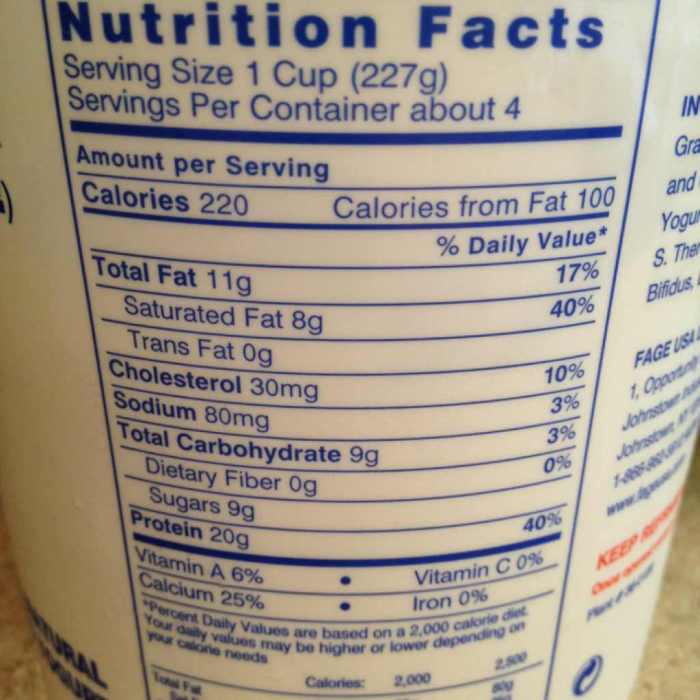Comparison with Other Dairy Products

Low fat greek yogurt 200g nutrition facts – Low-fat Greek yogurt often stands out in the dairy aisle, but how does its nutritional profile compare to other popular choices? Understanding these differences can help you make informed decisions about which dairy product best suits your dietary needs and goals. This comparison will focus on protein, fat, and carbohydrate content, key factors influencing satiety, muscle building, and overall health.
The following table presents a comparison of the nutritional content of 200g of low-fat Greek yogurt with other common dairy products. Note that nutritional values can vary slightly depending on brand and specific product formulations. These values represent averages based on readily available nutritional information.
Nutritional Comparison of Dairy Products (per 200g serving)
| Product | Protein (grams) | Fat (grams) | Carbohydrates (grams) |
|---|---|---|---|
| Low-fat Greek Yogurt | 25-30 | 5-8 | 10-15 |
| Regular Yogurt (whole milk) | 15-20 | 10-15 | 15-20 |
| Whole Milk | 8-10 | 10-12 | 12-15 |
| Cheddar Cheese | 20-25 | 25-30 | 2-3 |
| Mozzarella Cheese | 15-20 | 20-25 | 2-4 |
Protein Content and its Impact
The higher protein content in low-fat Greek yogurt, compared to regular yogurt and milk, is a significant advantage. Protein contributes to satiety, meaning it helps you feel fuller for longer, which can be beneficial for weight management. Higher protein intake also supports muscle growth and repair, making it a valuable choice for individuals engaging in regular exercise or strength training.
For example, a bodybuilder aiming for muscle gain would find the higher protein content in Greek yogurt a valuable supplement to their diet compared to milk.
Understanding the nutritional profile of low-fat Greek yogurt (200g) is crucial for balanced eating. For those seeking lean protein alternatives, comparing it to other options like ground meat is helpful. A quick look at the ground turkey nutrition facts can provide a useful contrast, highlighting differences in fat content and protein levels. Returning to the yogurt, its high protein and lower fat content make it a versatile choice for various dietary plans.
Low-fat Greek Yogurt for Specific Dietary Needs, Low fat greek yogurt 200g nutrition facts
Low-fat Greek yogurt’s nutritional profile makes it a preferable option for several dietary needs. Its high protein content and relatively low fat content make it suitable for weight management strategies that emphasize protein intake and calorie control. Individuals following high-protein diets, such as those aiming for muscle growth or managing certain medical conditions, will find its protein density advantageous.
Furthermore, the lower carbohydrate content compared to regular yogurt makes it a more suitable choice for individuals managing blood sugar levels or following low-carb diets. For instance, a person with type 2 diabetes might choose Greek yogurt over regular yogurt due to its lower carbohydrate impact.
Health Benefits and Considerations: Low Fat Greek Yogurt 200g Nutrition Facts

Low-fat Greek yogurt, with its high protein content and beneficial bacteria, offers a range of potential health advantages. However, it’s crucial to consider individual factors and potential drawbacks before incorporating it into a regular diet. This section will explore both the positive and negative aspects of consuming low-fat Greek yogurt.
Greek yogurt’s nutritional profile contributes to several aspects of overall well-being. Its high protein content aids in satiety, potentially supporting weight management efforts. Furthermore, the presence of probiotics, live beneficial bacteria, promotes a healthy gut microbiome, impacting digestion and immune function. The calcium content contributes to bone health, particularly important for maintaining bone density throughout life. However, not all Greek yogurts are created equal; some brands contain significant added sugars, negating some of the health benefits.
Individuals with lactose intolerance may also experience digestive discomfort after consuming Greek yogurt, although lactose-free options are increasingly available.
Improved Gut Health
The probiotics naturally present in Greek yogurt, particularly strains like
- Lactobacillus* and
- Bifidobacterium*, contribute significantly to gut health. These beneficial bacteria help maintain a balanced gut microbiome, aiding in digestion and nutrient absorption. Studies have shown a correlation between regular probiotic consumption and improved symptoms of irritable bowel syndrome (IBS) and other digestive disorders. A balanced gut microbiome is also linked to a stronger immune system, reducing susceptibility to infections.
Bone Health Benefits
Greek yogurt is a rich source of calcium, an essential mineral for maintaining strong bones and preventing osteoporosis. Calcium is crucial for bone formation and density, and adequate intake throughout life is vital for preventing bone-related health issues later in life. The protein content in Greek yogurt also plays a supporting role in bone health, aiding in calcium absorption and overall bone metabolism.
Weight Management Support
The high protein content in Greek yogurt contributes to feelings of fullness and satiety, potentially aiding in weight management. Protein takes longer to digest than carbohydrates, leading to sustained energy levels and reduced cravings. This can be particularly helpful in managing weight, as it can help individuals feel satisfied with smaller portions and avoid overeating. However, it is important to choose low-sugar varieties to avoid negating this benefit.
Lactose Intolerance Considerations
Lactose intolerance, a condition where the body has difficulty digesting lactose (milk sugar), can cause digestive discomfort such as bloating, gas, and diarrhea after consuming dairy products. While Greek yogurt generally contains less lactose than milk due to the straining process, individuals with severe lactose intolerance may still experience symptoms. Fortunately, lactose-free Greek yogurt options are readily available for those with this sensitivity.
Added Sugar Content
Many commercially produced Greek yogurts contain added sugars, which can counteract some of the health benefits. Excessive sugar intake is linked to weight gain, increased risk of type 2 diabetes, and other health problems. Therefore, it’s crucial to check nutrition labels and opt for varieties with minimal or no added sugar. Plain Greek yogurt allows for greater control over added sweetness, allowing you to add your own natural sweeteners like fruit or honey in moderation.
Visual Representation of Digestive System Benefits
Imagine an illustration depicting a healthy digestive system. The large intestine is shown as a vibrant, smoothly functioning tube, teeming with diverse, brightly colored beneficial bacteria (probiotics). These bacteria are actively working, represented by small animated actions like tiny arms reaching out and breaking down food particles. In contrast, a smaller section of the illustration shows a sluggish, less vibrant intestine with fewer bacteria and larger, undigested food particles.
The healthy intestine is labeled “Greek Yogurt’s Positive Impact: Balanced Gut Flora,” while the unhealthy intestine is labeled “Unbalanced Gut Flora.” The overall image is bright and cheerful, highlighting the positive transformation that regular consumption of Greek yogurt can bring to the digestive system.
Frequently Asked Questions
Is low-fat Greek yogurt suitable for lactose-intolerant individuals?
While generally lower in lactose than other dairy products, some individuals with lactose intolerance may still experience symptoms. Lactose-free varieties are available for those with severe intolerance.
How long can I store an opened container of low-fat Greek yogurt?
Once opened, store low-fat Greek yogurt in the refrigerator and consume within 5-7 days for optimal freshness and safety.
Can I freeze low-fat Greek yogurt?
Yes, you can freeze low-fat Greek yogurt, but the texture may change slightly upon thawing. It’s best to freeze it in individual portions for easier use.
Does low-fat Greek yogurt contain probiotics?
Some brands of low-fat Greek yogurt contain added probiotics, which contribute to gut health. Check the label to confirm the presence of live and active cultures.
What are the best ways to incorporate low-fat Greek yogurt into my meals beyond just eating it plain?
Low-fat Greek yogurt can be used in smoothies, dips, sauces, marinades, and baked goods. Its creamy texture and mild flavor make it a versatile ingredient.